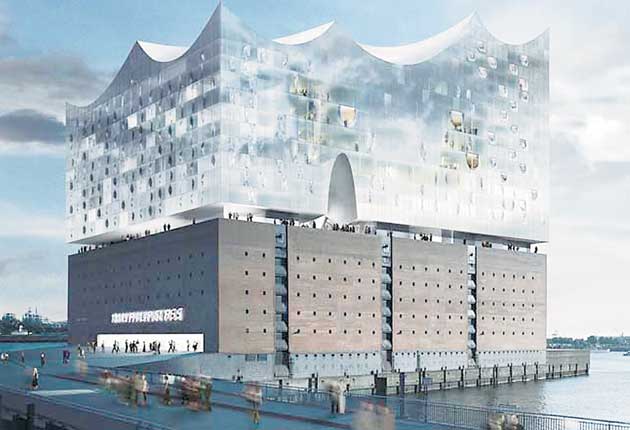The €500m concert hall that was only meant to cost €40m
Taxpayers blame politicians for spiralling cost of 'Hamburg's Sydney Opera House'

It aims to be Hamburg's answer to Sydney's iconoclastic opera house. A gigantic glass and steel concert hall complex built in the shape of rolling ocean waves and designed to tower majestically over the river Elbe like some fabulous watery castle floating on air.
Yet the German port's 2,000-seat Elbe Philharmonic hall – one of Hamburg's most ambitious publicly financed projects ever – is years behind schedule and saddled with an explosion in costs which are 12 times those envisaged when plans were unveiled seven years ago.
The project was launched on a wave of public euphoria amid promises that it would be: "one of the 10 best concert halls in the world". But it has since become an embarrassment for Hamburg politicians called to account for the nightmarish bills taxpayers are being asked to foot. Instead of being the city's landmark architectural jewel, it has become Hamburg's financial millstone – if not its folly.
"It is a great project, but had we known from the start how much it was going to cost, we would never have voted in favour of it," admitted Peter Tschentscher, one of the city's MPs.
Last week the German construction firm, Hochtief, was forced to admit that the completion date – set to be celebrated with a prestigious inaugural concert by the Vienna Philharmonic Orchestra – had been postponed yet again because of financing and building difficulties. The concert hall will not open before the mid-2012 at the very earliest.
The costs, estimated at €40m when the architect's design was first presented to the public in 2003, have since hit €503m, with an additional €40m possibly needed over the next two years. Hamburg's taxpayers are being asked to pay €400m.
"The Elbe Philharmonic story is one full of miscalculations and bad designs that are now beginning to take effect," said Der Spiegel news magazine, arguing that the project's backers had become so obsessed with building a unique and unassailably beautiful artistic creation that they had become blind to flaws inherent in the project. "These mistakes have been ignored for too long," it concluded.
The 1.3m square metre complex was intended to crown Hamburg's HafenCity (Harbour City) project – another ambitious scheme begun more than a decade ago which has both modernised and gentrified Hamburg's 19th century dock area. The renowned Swiss architects Jacques Herzog and Pierre de Meuron, who designed Beijing's Birds' Nest stadium, submitted a design for the Philharmonic to be built on top of a derelict warehouse on the waterfront.
The Hamburg city government accepted their design almost immediately and did bother to allow other architects, with potentially less expensive offers, to compete . The Herzog-Meuron design will provide visitors with a vast terrace with wide panoramic views overlooking the Elbe. A cavernous hall will provide 2,200 seats for audiences which will surround the orchestra situated on an island in the centre of the auditorium.
But such features were apparently not enough for Hamburg's politicians. Soon after the project won approval, the city government demanded major and hugely expensive "improvements". These have resulted in two additional concert halls being added to the original design and innovative features, such as a wave-like, glass façade, with individual panes of different shapes.
In its quest to have one of the best concert houses in the world, Hamburg has also recruited Yasuhisa Toyota, reputedly the world's best acoustic designer, to mastermind the interior sound structure. At his insistence the concert hall interiors are to be covered in a so-called "white skin" comprised of 10,000 differently-shaped plaster-of-Paris tiles that are meant to create near perfect acoustics. Hamburg is paying around €15m for the tiles alone. When asked about the cost, Mr Toyota said: "I have no idea how expensive it is, but one thing I do know, it is unique."
With the project two thirds completed, Hamburg now has little option but to carry on. To axe the concert hall at this late stage would cripple prospects of any return of the €500m investment. Inevitably, the city's government has faced charges that it may have been duped into agreeing to an initial low costing for the project only to be confronted with spiralling price increases by the contractors when it was already too late.
To its credit, Hamburg has been prepared to take the rap for its own massive financial miscalculations. "There was no political motive behind the cost appraisal," insisted Karin von Welck, the city's senator for culture. "It was provided to us with a clean conscience and to the best of the contractors knowledge."
As one commentator put it last week: "In a hundred years at the latest – no one will be worried about the costs."
Musical numbers
1.3msquare metres Area of musical complex
2,200 Number of seats in concert hall
10,000 Number of tiles in "White Skin" built for near-perfect accoustics
€15m Cost of "White Skin" tiles
Join our commenting forum
Join thought-provoking conversations, follow other Independent readers and see their replies
Comments
Bookmark popover
Removed from bookmarks